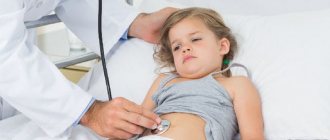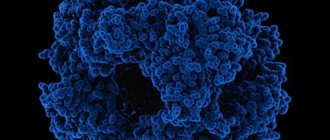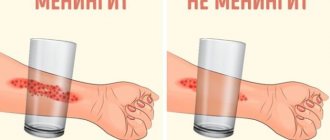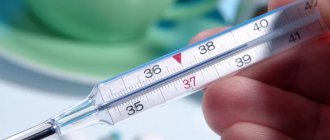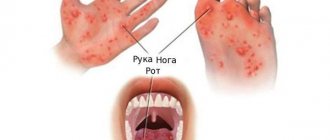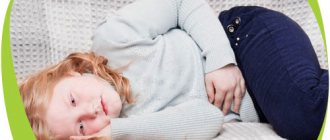How can a child become infected?
There are certain conditions under which a child may get this infection. The occurrence of the disease will be facilitated by:
- Irregular and inadequate nutrition of the child;
- Poor hygienic and sanitary conditions in which the child and his family live;
- The child eating low-quality or stale foods;
- Presence of stomach and intestinal diseases;
- The presence of immunodeficiency conditions (the child often suffers from colds or is often treated with antibiotics)
The source of infection for rotavirus disease is a person who already has this disease. It is dangerous to others from the appearance of the first symptoms until the end of the disease (5-7 days).
This infection is transmitted through the digestive system. A child can become infected while swimming in a pond where there is rotavirus in the water. Infection can occur through dirty hands, dishes, towels, napkins, toys and other items if they were used by a sick person. The disease can also occur in a baby when consuming foods that contain rotavirus - most often these are various dairy products.
Rotavirus infection most often occurs in autumn or spring. A person can get this disease several times during his life.
From the moment of infection to the appearance of vomiting, abdominal pain or diarrhea in the child, it takes from several hours to several days.
Epidemiology
Rotavirus infection is a typical seasonal disease. According to statistics, in almost 93% of cases the disease develops in the winter months.
The infection often spreads in epidemic outbreaks - especially in kindergartens, hospitals, nursing homes and other institutions where children or adults with weakened immune systems are in close contact.
Children are most susceptible to infection. The share of rotavirus infection is 39.4% of all episodes of diarrhea under the age of 5 years.
Symptoms
Often, cases of the disease remain unidentified because they are perceived as ordinary intestinal disorders, go away on their own or with a diet, and do not entail visiting a doctor with mandatory testing to identify the pathogen. However, in some cases, this disease can lead to severe complications in children due to large fluid losses.
At the onset of the disease, the child may develop:
- Nasal congestion;
- Runny nose;
- Cough;
- Enlarged submandibular or other groups of lymph nodes.
When the disease develops:
- Stomach ache. Since the virus affects the intestines almost along its entire length, pain can occur throughout the abdomen or in different parts of it.
- Flatulence. Since at this time the intestinal cells release a lot of fluid into the lumen, gurgling and rumbling appears in the stomach. The affected intestines cannot properly and promptly digest and absorb food.
- The baby begins to vomit. It can be 1-2 times or more often. Vomiting continues for one to two days;
- Frequent loose stools, which may be yellow water. This symptom appears simultaneously with vomiting, or a little later. Loose, frequent stools in a child can last from several days to a week. During one day, stool can be several times, and in severe cases - more than fifteen times. This is caused by the affected intestinal cells releasing a lot of water.
- Body temperature rises. This symptom may last for one or several days in a child. These days there is lethargy, decreased appetite and mood.
- Pale skin;
- Lethargy;
- In an infant, you can find retraction of the large fontanel and eyeballs. All this will be a consequence of dehydration in the child;
- With severe rotavirus infection, the child may have seizures.
This is new material, but Tiger Cub once wrote on this topic - “Rotavirus infection.
(Please note that the information contained in an earlier article may not be entirely current.) Now we invite you to familiarize yourself with the modern view of this problem.The article was prepared by a team of pediatricians at the Tiger Cub Children's Clinic
What is rotavirus and what are its symptoms? How dangerous is rotavirus infection and how to help a sick child, how effective is vaccination against this virus?
About the disease.
Rotavirus infection is one of the types of acute intestinal infection. It is caused by a special type of virus - rotavirus, popularly this disease is often called “stomach flu”.
From the first lines we are clear - rotavirus has nothing to do with the influenza virus and any specific strains of it. Any flu can multiply and exist only on the mucous membranes of the respiratory tract. With rotavirus, everything is different; it “lives” in the small intestine, and therefore calling it the flu as a whole is not very correct.
For the first time, rotavirus (under a microscope resembling a wheel, and therefore called “rota” - wheel (lat.)) was discovered almost half a century ago by Australian researchers. According to existing medical statistics, 98% of children under the age of 3 have already had this disease at least once. It is transmitted the virus is transmitted through contact - fecal-oral, this is popularly called “dirty hands disease”.
A baby can become infected from a sick person through toys, door handles, dishes, and household items. The virus is extremely contagious. Although specific immunity to rotavirus is developed, it is almost irrelevant, since this virus has a lot of strains and varieties - science already knows at least 9 of them, and mutations are still ongoing.
All varieties of this virus are quite resistant to low temperatures, exposure to sunlight and air. Rotavirus survives for quite a long time in spring and sea water.
The incubation period is the time that passes after the virus enters the body until the acute stage of the disease begins. This period of time varies for different children.
The virus accumulates and replicates, usually within 3-7 days. The disease itself lasts about 2-3 days, and the body takes at least another 5 days to recover after recovery.
A child is contagious all the time from the moment of infection until the end of the recovery period. Even if the baby already feels well, viable microparticles of the virus still continue to be released in the stool. It is for this reason that we strongly do not recommend sending him to kindergarten or school immediately after the child feels better. This is very likely to lead to mass infection in the children's group.
The likelihood of infection with rotavirus does not in any way depend on the cleanliness of the family. Even if a mother washes and vacuums the entire house several times a day, if she forces her child to wash his hands with soap every hour, carefully monitors the quality of every product that ends up on the table, and does not allow him to drink water of dubious origin - all this hardly reduces the risk of getting sick. rotavirus.
The virus most often attacks children aged 6 months to 2 years. In general, children from birth to 5 years of age are at risk. In a newborn, this disease occurs somewhat less frequently, since the first six months after birth the child is favorably influenced by the mother’s “innate” immunity, which usually lasts for a maximum of six months. Then the baby becomes more vulnerable.
The World Health Organization provides the following figures: every year on our planet, about 25 million children become infected with rotavirus. Most recover fairly quickly and on their own. 2 million children end up in hospitals, which leads to the death of about 500 thousand children annually, but not from the rotavirus infection itself, but from the severe complications that occur during its course.
Symptoms.
The following main symptoms can be identified: • Diarrhea. • Vomiting • Abdominal pain. • Increased flatulence. • Increased body temperature. • Lethargy, pale skin. • Lack of appetite.
According to our statistics, the vast majority of cases of unexplained diarrhea in children under three years of age are a manifestation of rotavirus infection. In other words, if a child ate everything he usually ate and has no signs of food poisoning, then stool upset in 99% of cases indicates an attack by this particular type of virus.
Rotavirus is tropic (has a special affinity) for pancreatic cells. At the height of the disease, its function is impaired. At first, the stool becomes oily (poorly washed off), has a smooth shiny surface and a clayey consistency. Then transient lactase intolerance develops (the intestinal villi are affected), and the stool becomes increasingly watery. An imperative urge to defecate is characteristic.
It seems that everything that “enters” the child immediately “comes out” without stopping. For this reason, it is quite simple to distinguish rotavirus infection from poisoning (a disorder caused by bacteria) - the main clue for parents should be the consistency of the stool. Pasty diarrhea often occurs with food poisoning. Diarrhea “with water” is a viral diarrhea, and, as a rule, there are no other options.
With viral diarrhea, stool has a grayish color and a very strong, unpleasant odor. By 2-3 days, the contents of the pot acquire a clayey consistency and a yellowish-gray color. The sour smell persists.
Rotavirus infection is characterized by a sudden acute onset - with fever and vomiting. Sometimes vomit may have a specific odor of acetone; a child’s breath may smell similarly. At the next stage, enteritis and gastroenteritis, diarrhea develops (up to 10-12 trips to the toilet per day). Minor respiratory symptoms may appear - runny nose, sore throat, pain when swallowing, cough.
About treatment.
Diarrhea due to rotavirus infection usually goes away within 2-3 days, but poses a rather serious danger of dehydration. Almost all deaths that occurred with this disease became possible precisely because of critical loss of fluid and severe dehydration. The younger the child, the faster he develops dehydration, the more dangerous the rotavirus is for him. The infection is most severe in infants.
A serious complication caused by rotavirus in severe dehydration is pneumonia. Many cases of dehydration are complicated by serious disorders of the nervous system. Rotavirus and dehydration are especially dangerous for underweight children.
The main thing that parents should learn to do is not even to determine the origin of the baby’s diarrhea, but to be able to quickly assess whether the child has signs of dehydration. We strongly recommend that you consult a doctor in any case of diarrhea in a young child. But you can’t just sit still and do nothing; you have to watch carefully.
If a baby's tongue becomes dry, he begins to cry without tears, does not pee for more than 6 hours and practically does not sweat - this is a good reason to urgently call an ambulance. If the baby begins to lose consciousness, his eyes “sink”, his facial features “sharpen”, and he develops a high temperature - these are extremely dangerous symptoms, they indicate severe dehydration. Doctors' help is required immediately.
If dehydration begins, a child who cannot drink enough fluids to restore balance in the body needs intravenous water. This is what the inpatient treatment will be based on.
If there are no signs of dehydration, parents can easily cope with rotavirus intestinal infection on their own. And here the main therapy will be to prevent the onset of dehydration. For this, the child needs to be given water. The more often the better. The drink should not be cold or hot, but only at room temperature, since this is the liquid that is absorbed most quickly in the small intestine. If the baby refuses to drink in sips, he needs to be fed with a teaspoon more often, but he must drink. For rotavirus infection, we recommend taking special medications that should be in the medicine cabinet of every family with children - oral rehydration products (for example, Regidron, Humana Electrolyte). If there is no such medicine, it is not possible to buy it, then we recommend using a recipe approved by the World Health Organization: take 2 tablespoons of sugar, a spoonful of salt and a spoonful of soda per liter of water. The parents’ task is to give their child this saline solution at any cost. If this does not work, it is better to immediately call an ambulance.
First aid.
In general, the algorithm for reasonable parental actions in case of childhood diarrhea should always look like this: • Drink plenty of warm drinks. Frequent and fractional. Plain water and saline solution. If a child pees every 3 hours, it means he is consuming enough fluid to prevent dehydration. If you can’t get someone to drink even with a disposable syringe without a needle, call an ambulance. • Place a small child on his side so that in the event of an attack of vomiting he does not choke on the vomit. • Antipyretics - only if the temperature is above 38.5. • Monitor the child's condition and prevent dehydration. At the first symptoms of dehydration, call an ambulance. • Do not feed. If he really asks, give liquid porridge or puree in small quantities.
Before the doctor arrives, leave a diaper with stool or keep a sample of the contents of the potty to show the doctor. This way, the doctor will be able to diagnose the disease faster, and the likelihood of an error will be reduced (rotavirus, for example, is very similar to cholera in its initial stages).
It's a big mistake to give your child antibiotics. The disease is of viral origin, and antibacterial drugs are completely powerless against viruses. Treating a child with viral diarrhea with them is a real parental crime, since it not only does not bring benefit, but also increases the likelihood of complications.
Another mistake that can cost parents dearly is the unauthorized prescription of antidiarrheal drugs (for example, Enterofuril). With rotavirus, viral particles (more precisely, their microparticles) are released in the stool. Therefore, stopping diarrhea means prolonging the disease, leaving viral particles in the small intestine, where they will continue to destroy beneficial cells for some time. There is no need to fight diarrhea; it is a defense mechanism of the body.
Another misconception is the effectiveness of antiviral drugs for intestinal infections. Although some doctors continue to prescribe antiviral drugs for rotavirus infection, we strongly do not recommend taking them for an intestinal infection. Of course, whether or not to take the above tablets or syrups is up to you. But you should know that there are no antiviral drugs in nature with clinically proven effectiveness. Moreover, the effectiveness of these drugs against a specific pathogen, rotavirus, has not been proven. It is also worth abandoning homeopathic remedies (Anaferon, Oscillococinum). With them, with their effectiveness and proven action, everything is even worse (yes, this is possible), and the purchase of such drugs will only be an extra burden on the family budget and can cause additional stress for the baby.
Vaccination.
Many countries have already included vaccination against rotavirus intestinal infection in their mandatory National Vaccination Schedules. In Russia there is no such mandatory practice yet. Vaccination against rotavirus, according to Western experts, helps reduce morbidity by 80% and reduces the risk of death by 45%. That is, infection remains possible, but the course of the disease will be milder.
In the children's clinic "TIGER" the RotaTek vaccine is used to prevent rotavirus infection. The vaccine is taken orally (as drops in the mouth). RotaTek contains small quantities of live rotavirus artificially weakened in laboratory conditions. In most cases, the vaccine does not cause allergic reactions or side effects, it is quite easily tolerated even by the smallest patients.
The recommended vaccination period is from 1.5 months to six months. It is not advisable for older children to be vaccinated. A total of 3 doses of the vaccine are administered. Standard recommended RotaTek vaccination schedule: 2 - 3 - 4.5 months.
Naturally, vaccination will not be given to a child who is currently ill; vaccination against rotavirus is also contraindicated for children with congenital malformations of the gastrointestinal tract. As before any vaccination, before vaccination with RotaTek you need to see a pediatrician with test results (clinical blood test and general urine test). No special preparation is required for rotavirus vaccination.
Advice for parents.
During the acute phase of the disease, you should not feed the child unless he asks for food himself.
You should adhere to a strict diet not only during treatment, but also for some time after recovery: completely exclude from the menu whole milk and dairy products, sweet fruits, baked goods, meat, as well as fatty and fried foods. It is healthy to eat porridge with water, vegetable soups, white bread crackers, and oven-baked apples. Feeding should be frequent and in small portions. Very young children with rotavirus infection are not denied breast milk, no dietary restrictions are imposed, but they are ensured that they drink plenty of fluids. Breast milk itself contains antiviral components provided by nature, which will help the baby in the recovery process.
Occasionally, when rotavirus infection is severe, an infant may develop intolerance or partial intolerance to breast milk due to enzyme deficiency. In this case, you should reduce the number of breastfeedings and temporarily add lactose-free infant formula to the baby’s diet (until complete recovery).
A child sick with rotavirus should not necessarily be put to bed. If he has a high temperature, then bed rest is necessary. In all other cases, he should lead a normal lifestyle - play, walk.
Of course, you should stay away from the yard playground so as not to spread the rotavirus to other children, but a walk in an uncrowded park or square will be beneficial.
The most effective prevention of rotavirus is vaccination. Only then comes hygiene - you must wash your hands, of course with soap, thoroughly wash vegetables and fruits, and monitor the quality of the water your child drinks.
But once again, in fairness, we note that no hygienic tricks can guarantee a low probability of infection. Therefore, both in developed and civilized countries and in third world countries, the incidence of rotavirus is at an equally high level. If you are going to travel to the sea with a small child, we strongly recommend the rotavirus vaccine. Recently, this intestinal infection has become quite widespread at resorts, where children become infected with water. Every year, Rospotrebnadzor specialists “signal” about the unfavorable situation due to this disease on the Black Sea coast of the Caucasus, in Crimea and on the coasts of Bulgaria.
Diagnostics
In order for a doctor to diagnose rotavirus infection, it is necessary to conduct a stool test for the presence of particles of the virus genome in it (this method is called “polymerase chain reaction”). In addition, various other tests are performed on blood, urine and stool. This allows you to detect infection earlier and prevent complications in the child.
Under domestic conditions, it is very difficult to diagnose this infection for an ill family member. Therefore, consultation with a doctor is necessary in any case, no matter how confident a person is in this diagnosis and methods of its treatment. There are a large number of infectious and non-infectious diseases that occur with symptoms similar to rotavirus infection.
For example, parents may mistake non-infectious diseases of the liver, stomach, intestines, and pancreas for a manifestation of rotavirus infection. With them, the sick child complains of nausea, vomiting, abdominal pain after certain (fatty, spicy, fried) foods, or indicates that all manifestations are disturbing only on one side of the body and began after severe emotional stress.
Similar signs of the disease can occur in case of poisoning with drugs or poisonous plants (more often it is children who suffer from this if they are left alone at home and can get to the home first aid kit, or walk unattended and can try different berries).
Read more about food poisoning in children in our article “Recommendations from a pediatrician for food poisoning in a child.”
Online consultation with pediatrician Olga Nikolaevna Tekutyeva
Registration online
During the consultation, you will be able to voice your problem, the doctor will clarify the situation, interpret the tests, answer your questions and give the necessary recommendations.
Recovery from rotavirus
Children exposed to rotavirus infection need special care and nutrition. The intestine damaged by viruses cannot fully perform its functions1. Therefore, nutrition should be gentle8:
- ● infants continue to be fed breast milk2,8 at least 6 times a day, initially reducing the amount of food (feeding time) by 30–50%2,8.
- ● bottle-fed children are first transferred to low- and lactose-free breast milk substitutes1,8, then, when the condition improves, lactose-containing products are introduced into the diet2,8.
- ● older children receive their usual drinks and foods2, with the exception of those that enhance fermentation, stimulate the motor activity of the gastrointestinal tract and the secretion of digestive juices8.
Up to contents
Treatment
Rotavirus infection occurs differently in different children - in mild, moderate and severe form. If vomiting and loose stools in a child are not very frequent, then they speak of a mild form of rotavirus infection. The more often a baby has vomiting and diarrhea, the more fluid and microelements his body will lose, and the more severe this disease will be. Loss of water through stool and vomiting in a child leads to dehydration. If, with frequent vomiting and loose stools, you do not try to give a sick child a little water, this can lead to serious consequences of dehydration.
Treatment for rotavirus infection should begin as early as possible. Unfortunately, there is currently no drug that would directly destroy rotavirus. The main treatment is to restore the loss of fluid that leaves the body through vomiting and stool. The child is given oral rehydration - fed in small doses. It is best to restore fluid loss with solutions that contain sodium, potassium and glucose salts.
What can parents do before the doctor arrives?
Even before the doctor arrives, parents should start giving their sick child something to drink. You can try to do this in various ways. Some children drink well during illness using a spoon. Someone will have to slowly pour liquid into their mouth from a syringe. The main thing is not to rush and do it evenly and regularly - 5-20 ml every few minutes. If the baby continues to have nausea or vomiting, you need to make the intervals between drinks a little longer, but do not stop offering the patient something to drink. In addition to saline solutions, it is useful to drink dried fruit compote and chamomile decoction.
To reduce the symptoms of the disease, sorbents and preparations containing probiotics are used. Sorbents ensure binding and removal of the pathogen from the body. For this purpose, carbon, fibrous, mineral or synthetic sorbents can be used, which effectively sorb and remove from the body food decomposition products formed during enzymatic deficiency, help accelerate epithelial regeneration, reduce flatulence and pain, and also do not affect the composition of normal intestinal flora .
In some situations, enzymes may be used in treatment if the child has difficulty digesting food due to severe damage to the intestines and pancreas.
In addition to medications, it is important to pay attention to diet during illness. To prevent nausea, food should be given to the child in small quantities and more often. For about a month, you should exclude dairy products, fresh vegetables, fruits, pasta, baked goods, pastries, sweets, and fried foods from your diet.
Food is served to the patient boiled, stewed or baked without crust. The child should have such food for about a month, and then the diet can be gradually expanded.
If you rush and do not follow a diet, recovery will slow down. Complications may arise and chronic diseases of the liver, stomach, intestines or pancreas may develop.
Prevention of rotavirus infection
In order to prevent the occurrence of the disease, it is necessary to follow simple and familiar everyday rules - wash your hands before eating, when returning home from a walk, after communicating with a sick person. These same rules must be taught to every child from a very young age. If someone in the family is sick with rotavirus infection or another infectious disease, then the patient should have separate dishes, towels, bed linen and household items, which should be soaked daily in disinfectant solutions and thoroughly washed with hot water or boiled.
The most effective way to prevent any infectious disease, including rotavirus infection, is vaccination, which can be given to children aged 1.5 to 8 months. Vaccination takes place in three stages with an interval of at least four weeks between each vaccination. It involves dropping vaccine drops into the baby's mouth. The main thing is that the child is healthy at this moment. Then, after proper vaccination, your baby will be protected from a very unpleasant rotavirus infection.
Even after suffering a rotavirus infection, there is a chance to get this disease again, since the body does not always develop lasting immunity to the disease. Therefore, it is important for parents to always follow hygiene rules and not forget to vaccinate their child.
Possible complications8
Rotavirus infection poses the greatest danger to young children from the first days of life to 3-5 years and pregnant women:
- At an early age, intestinal flu is a deadly disease - severe dehydration of the body can lead to death.
- Dehydration caused by rotavirus gastroenteritis during pregnancy leads to the risk of miscarriage.
Possible complications of rotavirus infection:
- Pancreatitis, gastritis, enlarged pancreas.
- Intestinal inflammation.
- Hemorrhagic gastroenteritis.
- Acute renal failure.
- Circulatory disorders.
- Gasser syndrome.
- Necrotizing enterocolitis.
To minimize the risk of the disease and prevent the development of complications, it is important to promptly diagnose rotavirus infection and begin adequate treatment.
